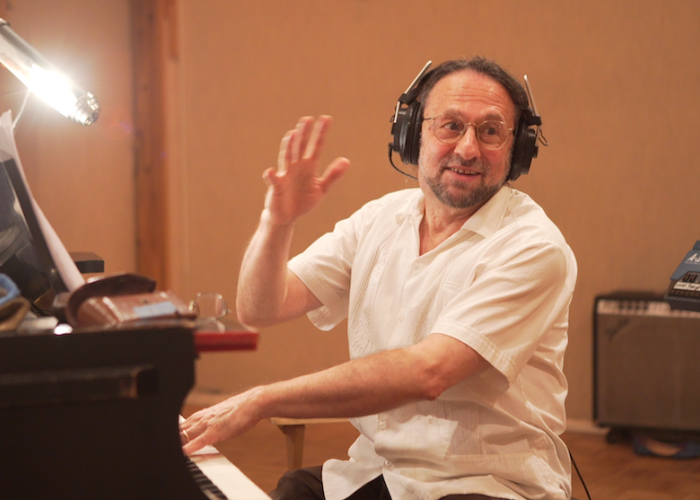Dec 9, 2025 12:28 PM
In Memoriam: Gordon Goodwin, 1954–2025
Gordon Goodwin, an award-winning saxophonist, pianist, bandleader, composer and arranger, died Dec. 8 in Los Angeles.…

Lewis Porter, whose new album is titled Solo Piano, is in a prolific phase of his career.
(Photo: Erin Harper)After flirting with a career in psychology, Lewis Porter, the jazz educator and pianist, turned to music full time during his twenties. But if his new album, Solo Piano (Next To Silence), is any indication, Porter, 67, has not lost his psychologist’s passion for exploring states of consciousness.
“Ragtime Dream,” one of six originals on the album, is a case in point. The song is distinguished by a precisely balanced, purposefully disorienting bitonality—the left hand sketches ragtime chords in one key, while the right hand counters with a melody in another—that conjures an improbable pianistic hybrid of James P. Johnson-meets-Paul Bley. Tellingly, the tune came to Porter in his sleep.
“The truth is, I’m a Hollywood-style composer,” he explained. “You wake up in the middle of the night and say, ‘Oh, my god, I’ve got it!’ That’s how this piece happened. Only after I wrote it down did I find a title for it. I thought, ‘It’s kind of like a ragtime piece, only ragtime gone crazy.’”
A dreamlike state also is induced by the original tune “Through The Clouds.” Appearing midway through the album, the track—built around a vaporous mass of lightly clustered chords against which single-note lines alight in the upper, lower and middle registers of the keyboard—engenders a detached sense of floating, as one might feel in the throes of a consciousness-altering meditation.
In that, the tune, which Porter described as the album’s centerpiece, seems an apt metaphor for the collection as a whole. “There is something intensely meditative about just being at the piano and only thinking about what you’re playing and finding the next sound,” he said.
The album, Porter’s first all-solo effort, is so evocative that one wonders what he might have achieved had he not devoted much of his life to academic pursuits, which often took him away from the piano. The time has been well spent, though. Beyond his early interest in psychology studies, Porter has taught jazz at several universities, pioneering a master’s degree program in jazz history at Rutgers. He also has written authoritative biographies, notably 1998’s John Coltrane: His Life and Music (University of Michigan Press). But he’s had regrets about not spending more time at the keyboard. “I do say to myself all the time, ‘You really should have worked on this 50 years ago,’” Porter said.
Around the time the Coltrane book came out, the pianist resolved to spend time practicing every day. Now, having given up full-time teaching, he is enjoying the fruits of those labors: “I have a saying: ‘If you like where you ended up, you cannot regret how you got there.’”
By any measure, Porter is experiencing a late-career musical flowering. Last year, he released both Beauty & Mystery (Altrisuoni)—featuring bassist John Patitucci and drummer Terri Lyne Carrington, with saxophonist Tia Fuller as a guest—and Longing (Cadence Jazz), with regular bandmates Joris Teepe on bass and Rudy Royston on drums, augmented by guitarist Ray Suhy. And lately, Porter has been playing more high-profile concerts, among them duos with pianists Vijay Iyer and Ethan Iverson.
Through it all, his life as a scholar brings context to his musical interpretations—not least when he tackles Coltrane. In discussing the saxophonist’s “Central Park West,” which closes Solo Piano, Porter noted that the tune comes out of the “Giant Steps” period, circa 1960, when Coltrane was producing highly structured, change-heavy work. It thus invites patterned improvisation. But Porter (a Manhattanite who lives a block from the title street) manages to escape the trap—stretching the form, altering the chords and spinning chromatic lines around them. All of this is driven, in psychologist’s lingo, subliminally.
“I’m certain that the scholarly side informs the playing side,” Porter said, “but it’s not in a conscious way.” DB

Goodwin was one of the most acclaimed, successful and influential jazz musicians of his generation.
Dec 9, 2025 12:28 PM
Gordon Goodwin, an award-winning saxophonist, pianist, bandleader, composer and arranger, died Dec. 8 in Los Angeles.…

Belá Fleck during an interview with Fredrika Whitfield on CNN.
Jan 13, 2026 2:09 PM
The fallout from the renaming of the John F. Kennedy Center for the Performing Arts to include President Donald…

The success of Oregon’s first album, 1971’s Music Of Another Present Era, allowed Towner to establish a solo career.
Jan 19, 2026 5:02 PM
Ralph Towner, a guitarist and composer who blended multiple genres, including jazz — and throughout them all remained…

Rico’s Anti-Microbial Instrument Swab
Jan 19, 2026 2:48 PM
With this year’s NAMM Show right around the corner, we can look forward to plenty of new and innovative instruments…

Dec 11, 2025 11:00 AM
DownBeat presents a complete list of the 4-, 4½- and 5-star albums from 2025 in one convenient package. It’s a great…